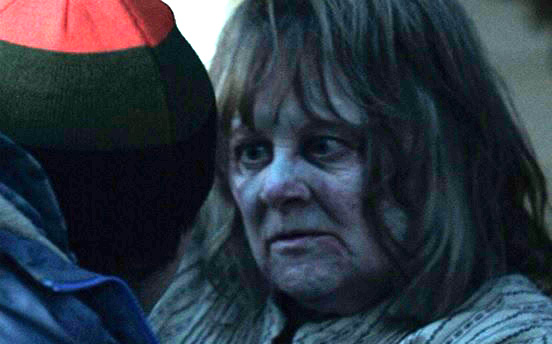Sometimes I come back for post-80s Stephen King movies again. Let’s get right into another three.
MERCY (2014)

Not that M. Night’s The Visit or this film were the first horror flicks about scary grandmothers, but it’s kind of surprising that this one was released a year before The Visit and not a cheap cash-in to piggyback on that bigger Hollywood release, which is what it feels like.

Based on the short story “Gramma” from the fiction collection Skeleton Crew, this King story had already been adapted into an episode of The Twilight Zone back in the 80s. Maybe the limited original source material would explain why even the full-length film is only 78 minutes long.

It starts off strong with a guy axing himself in the head. Then Carl from The Walking Dead comes with his mother and brother to live in a rural home with their bedridden grandmother, who needs constant care.

Carl used to be close to his rather spiritually mystical grandma, but now she is quite creepy, and the reason why is revealed as the story unfolds.

It’s not all that frightening, but the final battle with what irks grandma is quite satisfying as far as scary granny movies go. Unfortunately, everything is filmed soooo dark you don’t really see any of the action (unless you lighten the screen grabs with Photoshop…).

Dylan McDermott appears in a role that is virtually pointless, as does the creepy dude from Creep—losing their inclusion could have shaved another twenty minutes or so off the running time. In other words, this probably just works better as an episode of The Twilight Zone…
DOLORES CLAIBORNE (1995)

It would be so easy for King fans to criticize this film because it breaks somewhat from the original novel, but that change somehow enhances the story even more. Plus, it’s an incredibly compelling tale and loaded with fantastic performances.

Jennifer Jason Leigh plays the grown daughter to Kathy Bates’ version of Dolores, whereas the novel character didn’t have a relationship building plotline with her estranged, adult daughter. JJL comes to the small island on which she grew up when Dolores is accused of murdering the rich elderly woman she worked with for decades.

The detective on the case, played by Christopher Plummer, believed Dolores killed her abusive husband years before during an eclipse.

And so do many of the locals, who harass Dolores relentlessly, which just stirs up memories for JJL of when she lost her father.

The clash between mother and adult daughter sparks numerous flashbacks to what transpired both with the father and with Dolores’s employer as this engrossing and dark movie explores repressed memories, physical abuse, emotional abuse, and sexual abuse.
GERALD’S GAME (2017)

Directed by Mike Flanagan of Absentia fame (also, Oculus and Doctor Sleep), this is a faithful adaptation of another Stephen King novel burdened by sexual abuse of a daughter by her father. And that abuse takes place on the same shores of the same body of water during the same eclipse as Dolores Claiborne!

Dolores Claiborne and Gerald’s Game were companion novels, and although this movie that comes almost twenty years later isn’t specifically a companion movie, it easily could be considered one, because it clearly references the linking occurrence in Dolores Claiborne without ever speaking her name. Cool.

The focus is on a troubled couple trying to save their marriage. They come to their summer home, the husband handcuffs the wife to get kinky then keels over dead, and she spends the rest of the film trying to figure out how to escape her restraints.

To infuse his horror reputation into the story, King includes a hungry stray dog (ew), and a freaky looking man who creeps into the room in the shadows at night looking for jewelry. But this is actually a tale of a woman coming to terms with how her entire sex life and concept of love have been warped and made her a prisoner of her own past due to what her father did to her when she was a child. The flashback of the father (Henry Thomas) doing his thing with her is even more disturbing than a similar scene in Dolores Claiborne, including the way in which he manipulates her into keeping it secret.

It’s hard to get through, and in film form the side story of the metaphorical yet real monster man that comes into her room at night feels really out of left field. In my opinion it kind of takes away from the main plot as it jarringly becomes the focus at the very end of the film.


